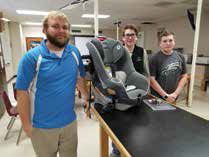Educators Honored for Innovative Projects : Contest Winner Roundup
Tools and ideas to transform education. Sign up below.
You are now subscribed
Your newsletter sign-up was successful
Schools around the country have been recognized for their innovative entries in the following contests:

2017 Vernier Engineering Contest: Two science teachers have won $5,500 in prizes for their creative use of Vernier sensors to introduce engineering concepts. Carl Stoltz, of Hononegah High School in Rockton, Illinois, created “Sound Proofing Box,” a project that combines learning the physics of sound waves with practicing engineering principles. A group of Tate Rector’s students from Beebe Junior High School in Beebe, Arkansas, worked collaboratively to design “Baby Saver 2000,” a safety device for cars that warns operators when the interior is becoming too hot for infants.
Samsung Solve for Tomorrow Contest: Three public schools in Arizona, Nebraska, and New York have been named national winners in this contest, which challenges students in grades 6–12 to use STEAM to address real-world problems in their communities. This year’s winning entries tackled student hunger, wildlife safety, and overabundant pesticides in crops.
● Students at the Secondary School for Journalism in Brooklyn, New York, created an app that helps fellow students in need get after-school meals—meals that might have otherwise gone to waste—from local restaurants.
● Gering High School students in Gering, Nebraska, developed a drone-powered spraying system to target weeds and use fewer chemicals on crops.
● Students from Snowflake Junior High School in Snowflake, Arizona, created a low-cost wildlife detection system to reduce accidents by alerting drivers to animals crossing the road.
Winners received $150,000 in technology products and a $20,000 donation to a local nonprofit of their choice.
PBS Digital Innovators Program: PBS Education has recognized 52 teachers for their integration of digital media in the classroom in a way that sparks a love of learning. These Digital Innovators will partner with local PBS stations to build learning outcomes in communities across the US. Among those selected were teachers who are using 3D printers with their students to create prosthetic limbs, a technology coach whose classroom is a “STEM Bus,” and co-teachers who use technology to bring their students together in one class, even though they’re in physical classrooms that are miles apart. The 52 winners for 2017 will participate in professional development courses, have access to exclusive resources from PBS LearningMedia, and are invited to special events, such as the 2017 PBS Digital Summit in San Antonio Texas.
For more details about the winning projects go to www.techlearning.com/June17
Tools and ideas to transform education. Sign up below.
